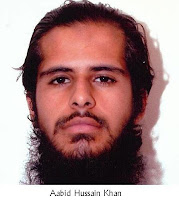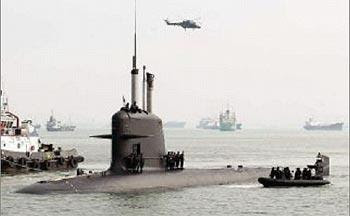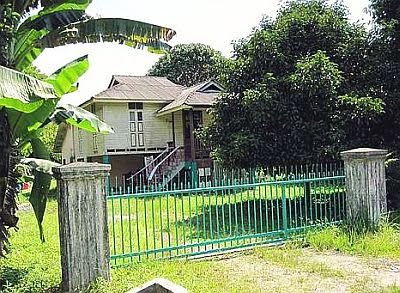Operation Praline
 In June 2006, a team of British law enforcement units (led by the West Yorkshire Police) carried out a series of linked arrests in the cities of London, Manchester, Bradford, and Dewsbury in the United Kingdom. The detained suspects in the investigation known as “Operation Praline” included 22-year old British national Aabid Hussain Khan; 21-year old British national Sultan Mohammed; and 16-year old British national Hammaad Munshi. All of the men would later be indicted by the Crown Prosecution Service (CPS) for violations of Section 57 of the U.K. Anti- Terrorism, Crime, and Security Act of 2001. In August 2008, following a jury trial at Blackfriars Crown Court in London, Khan, Mohammed, and Munshi were found guilty of charges that included possessing an article for a purpose connected with the commission, preparation, or instigation of an act of terrorism, and making a record of information likely to be useful in terrorism. Khan and Mohammed were each sentenced, respectively, to 12 and 10-year prison terms. According to Karen Jones, the reviewing lawyer in the case from the U.K. Crown Prosecution Service Counter Terrorism Division, “The evidence showed Khan was a committed and active supporter of Al Qaida ideology. He had extensive amounts of the sort of information that a terrorist would need and use and the international contacts to pass it on… Aabid Khan was very much the ‘Mr. Fix-it’ of the group. He preyed on vulnerable young people and turned them into recruits to his cause, using internet chat to lure them in then incite them to fight. He arranged their passage to Pakistan for terrorism training, and talked about a ‘worldwide battle.’
In June 2006, a team of British law enforcement units (led by the West Yorkshire Police) carried out a series of linked arrests in the cities of London, Manchester, Bradford, and Dewsbury in the United Kingdom. The detained suspects in the investigation known as “Operation Praline” included 22-year old British national Aabid Hussain Khan; 21-year old British national Sultan Mohammed; and 16-year old British national Hammaad Munshi. All of the men would later be indicted by the Crown Prosecution Service (CPS) for violations of Section 57 of the U.K. Anti- Terrorism, Crime, and Security Act of 2001. In August 2008, following a jury trial at Blackfriars Crown Court in London, Khan, Mohammed, and Munshi were found guilty of charges that included possessing an article for a purpose connected with the commission, preparation, or instigation of an act of terrorism, and making a record of information likely to be useful in terrorism. Khan and Mohammed were each sentenced, respectively, to 12 and 10-year prison terms. According to Karen Jones, the reviewing lawyer in the case from the U.K. Crown Prosecution Service Counter Terrorism Division, “The evidence showed Khan was a committed and active supporter of Al Qaida ideology. He had extensive amounts of the sort of information that a terrorist would need and use and the international contacts to pass it on… Aabid Khan was very much the ‘Mr. Fix-it’ of the group. He preyed on vulnerable young people and turned them into recruits to his cause, using internet chat to lure them in then incite them to fight. He arranged their passage to Pakistan for terrorism training, and talked about a ‘worldwide battle.’The de-facto leader of the “cell”—Aabid Khan—was taken into custody at Manchester International Airport upon arriving on a return flight from his native country of Pakistan on June 6, 2006. Khan describes himself as originally hailing from the northwestern Pakistani town of Attock, though his first trip to Pakistan for a visit with family took place in 1989 when he was 5 years old.2 In 1996, at the age of 12, Khan made his second trip to Pakistan, again to see family members.3 In 2002 and 2003, Khan again traveled back to Pakistan for a third and fourth time.4 These trips were fairly lengthy in duration, lasting from between 3-6 months, and had a substantial impact on Khan. Back in the U.K., given his intense religious beliefs, Khan had persistent difficulties fitting in and had failed to secure steady employment. While testifying at Blackfriars Crown Court in London, Khan complained of his “problems working in Bradford, getting a job. [I was] always getting fired.
Khan has openly acknowledged his relationships with his alleged co-conspirators. He identified Sultan Mohammed as a family “relative” from “the same village” in Pakistan who “lived on the same street in Bradford. Khan indicated that he had been introduced to Hammaad Munchi by Sultan Mohammed in January 2005 while at the central mosque in Dewsbury which, according to Khan, is “one of the main places for Muslims to gather to listen to a lecture or meet other Muslims. They come from all over the U.K. on a regular basis… I have been a regular visitor for many years.” Following their initial introduction, Khan admitted to “speaking and communicating from time to time” with Munchi, and noted that Munchi “had a general interest that many Muslim youngsters have… religion was the main factor.
[read more in http://www.nefafoundation.org/reports.html#khanreport]


Comments